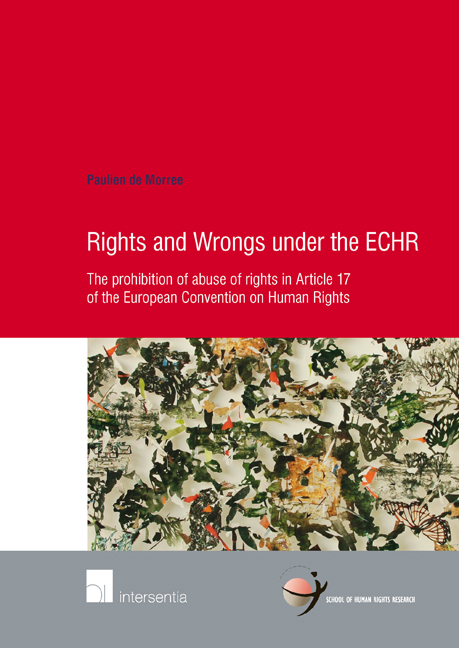 Rights and Wrongs under the ECHR
Rights and Wrongs under the ECHR Book contents
- Frontmatter
- Acknowledgements
- Contents
- List of Abbreviations
- Chapter 1 Introduction
- Chapter 2 The Creation of the European Convention on Human Rights
- Chapter 3 The Strasbourg Case Law on Article 17 ECHR
- Chapter 4 The Interpretation of Article 17 Echr in Legal Doctrine
- Chapter 5 Other Abuse Clauses in Human Rights Law
- Chapter 6 The Concept of Abuse of Rights
- Chapter 7 The Concept of Militant Democracy
- Chapter 8 The German ‘Wehrhafte Demokratie’
- Chapter 9 Militant Democracy in the Context of the ECHR
- Chapter 10 Conclusions
- Bibliography
- Table of Cases
- Samenvatting
- Curriculum Vitae
- School of Human Rights Research Series
Chapter 3 - The Strasbourg Case Law on Article 17 ECHR
Published online by Cambridge University Press: 12 December 2017
- Frontmatter
- Acknowledgements
- Contents
- List of Abbreviations
- Chapter 1 Introduction
- Chapter 2 The Creation of the European Convention on Human Rights
- Chapter 3 The Strasbourg Case Law on Article 17 ECHR
- Chapter 4 The Interpretation of Article 17 Echr in Legal Doctrine
- Chapter 5 Other Abuse Clauses in Human Rights Law
- Chapter 6 The Concept of Abuse of Rights
- Chapter 7 The Concept of Militant Democracy
- Chapter 8 The German ‘Wehrhafte Demokratie’
- Chapter 9 Militant Democracy in the Context of the ECHR
- Chapter 10 Conclusions
- Bibliography
- Table of Cases
- Samenvatting
- Curriculum Vitae
- School of Human Rights Research Series
Summary
INTRODUCTION
In the previous chapter we have seen that the abuse clause in Article 17 ECHR was included in the Convention with the aim of preventing ‘totalitarian currents from exploiting in their own interests the principles enunciated by the Convention’. The provision is the most explicit expression of the ambition of the Convention as a whole: preventing the emergence or re-emergence of totalitarian regimes in Western Europe. At the same time we have also seen that the text of the abuse clause in Article 17 ECHR is rather ambiguous. Neither the wording of the provision nor the travaux préparatoires make clear how it should be interpreted in practice. Who, exactly, can abuse the rights in the Convention? Can all the rights and freedoms in the Convention be abused? Which activities and acts are considered to aim at the destruction of rights and freedoms? What does the destruction of rights and freedoms actually mean? And what are the legal consequences of the abuse of fundamental rights and freedoms?
It is the role of the European Court of Human Rights (and of the European Commission of Human Rights until its dissolution in 1998) to interpret the Convention. This chapter seeks to identify the interpretation of Article 17 ECHR by the Court and the Commission. It analyses the judgments and admissibility decisions that have significantly contributed to the development, clarification, or modification of the interpretation of Article 17 ECHR. With a yearly case law running into thousands of judgments and decisions, the Strasbourg supervision has developed into a strong enforcement system. Yet, judgments and decisions in which the scope and interpretation of Article 17 ECHR are defined are rare. Especially in the first years after the entry into force of the Convention Article 17 ECHR led a relatively quiet existence. The American scholar Weil, writing in 1960, believed that Article 17 ECHR was one of criteria related to the admissibility of complaints ‘which have not been used excessively in the past and those which by virtue of the passage of time are likely to be less important’. Over the years, however, the interest in Article 17 ECHR has increased and the provision seems less dormant than Weil predicted. In some of the cases discussed, the abuse clause was invoked by one of the parties.
- Type
- Chapter
- Information
- Rights and Wrongs under the ECHRThe prohibition of abuse of rights in Article 17 of the European Convention on Human Rights, pp. 23 - 66Publisher: IntersentiaPrint publication year: 2016
- 5
- Cited by
